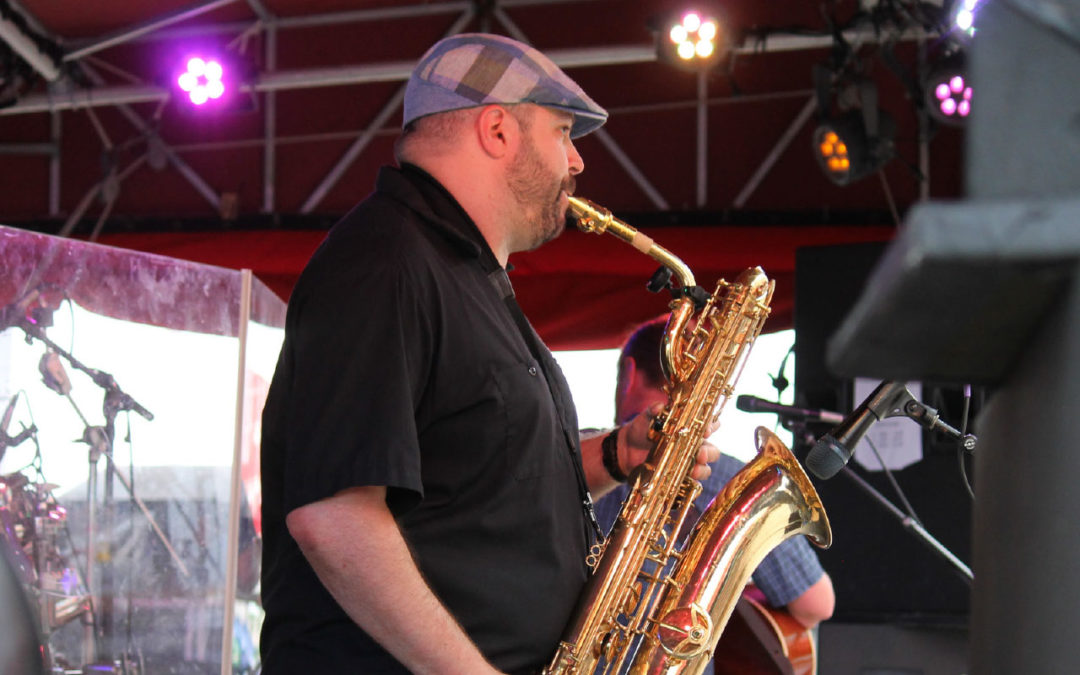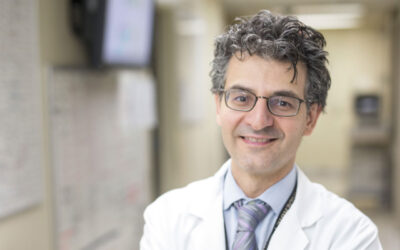
Bryan Streitfeld has been influenced by Kenny G and punk music.
– By Matt Skoufalos –

Bryan Streitfeld shares his love of music with his daughters.
For medical dosimetrist Bryan Streitfeld, the working day is a long one.
It begins with a 4:30 a.m. wake-up and 6:30 a.m. arrival to the Helen F. Graham Cancer Center in Newark, Delaware, where he spends the next several hours developing radiotherapy treatment plans for patients battling a cancer diagnosis.
It’s a high-wire act that requires insight from a number and variety of health care professionals; a mix of artistry and precision science. Beyond his years of career-specific schooling, Streitfeld has been cultivating the skill set that most prepared him for the challenges of the job since the age of 10, when he first picked up the saxophone.
Some 30 years later, music has taken him through venues across the United States, in front of audiences great and small, with fellow artists of all kinds. Those workdays that start at 4:30 a.m. can stretch 20 hours or more if he’s playing a show afterward, but the reward they offer is worth more than a little additional cash.
“When I was thinking about what career I wanted to get into, one of the important things was having availability Friday and Saturday nights,” Streitfeld said. “I was going through radiography with the intent of going into radiation therapy, and when I was in therapy school, got to hang out with a dosimetrist and realized, those are my people. It was a perfect fit for my brain.”
“It’s the same thing when I’m onstage,” he said. “Every new song is a puzzle you’ve got to solve, just like there’s no template that will work with every patient. It takes creativity and analytical thought.”
Streitfeld’s musical path was set as a child because his mother liked the saxophone, and once he took it up, “she said I wasn’t allowed to quit.” His relationship with the instrument began with Kenny G and elementary school band, until eighth grade, when he was introduced to the Boston alt-rock band, Morphine. Their prodigiously talented saxophone player Dana Colley was known for playing both the baritone and tenor saxophones, often at the same time. The other band that was a formative influence at the time was Washington, D.C. hardcore/punk outfit Fugazi, with whose raw energy and presence he formed an instant connection.

Bryan Streitfeld enjoys playing live shows and writing music and lyrics at home.
By 16, Streitfeld and his neighbors in Hammonton, New Jersey had formed their own ska-punk band, The Havoctones. On Friday and Saturday nights, they’d pile into a car and drive across the tri-state area of Pennsylvania, New Jersey and Delaware, “opening many times for bands that went on to become bigger,” he said.
“It was really hanging out with your friends and playing music,” Streitfeld said. “We were just a bunch of idiots having fun.”
The band pressed on for a few years, until its frontman “fled the state due to unpaid parking tickets,” and Streitfeld joined up with another New Jersey ska-punk project called SGR. He’d already shared the stage with them multiple times when he was invited to join the horn section in 1999, while the band was recording its second studio album.
“They were way more talented than I was,” Streitfeld said. “I felt like I was moving up a little bit. It did feel a lot more professional.”
At the time, he felt himself brushing up against his limits as a young performer (“I couldn’t improvise; I couldn’t figure stuff out,” Streitfeld said), but the band was a 10-piece powerhouse, and its live energy was more than enough to book shows across the region. They made an impact at the Warped Tour in Camden, New Jersey, and later signed with an independent label out of Pennsylvania, which paid for the recording of its third album. From there, the band began touring throughout the United States and Canada, opening for Grammy-winning acts, and enduring personnel shuffles over nearly a decade of work.
“We stopped being so one-dimensional; we started playing a lot of different things,” Streitfeld said. “We toured the most we’d ever toured. It was some of the best times of my life. I got to see places I never thought I’d see.”
When SGR finally called it quits, Streitfeld took a few years off from performing. He focused on his day job in information technology, and went back to school to pursue a radiography degree. After a while, he realized he missed playing, and started to pick up different instruments to expand his repertoire. At the same time Streitfeld was pushing himself to study radiation therapy and medical dosimetry, he was learning keyboard, harmonica, accordion, violin, mandolin, ukulele; “basically everything except for drums and brass.”
“It didn’t have to be for anybody, or for any specific purpose; it was just for the joy of playing,” he said. “I was definitely depressed not playing music, and that’s when I joined a cover band that got me playing again. I used any break in school partially to supplement my income, but also to learn a new instrument. That was my goal.”
After sharpening his skills, Streitfeld joined an acoustic duo called Overworked and Unemployed. It was a departure from the large ensembles in which he’d previously toured, and adding saxophone into a musical environment with so much open space “really clicked,” he said. The duo expanded into a bigger act with rotating players called The Indelible Groove. The project has been performing regularly throughout the Jersey shore for the past three years, and Streitfeld is happy to be a part of it.
“We have a large circle of friends that are on the level with how we operate as a band,” he said. “These are quality musicians who can jump in, and the color of our performance changes. We can complete each other’s sentences musically. If someone new enters the mix, we’ll change it up as we’re performing.”
When he’s not gigging, Streitfeld continues to write and record at home. He’s even passed on his gifts to his daughters, one of whom is already writing her own music and lyrics. Someday when they’re ready to begin touring and performing, they won’t have far to go for advice – or a bandmate.








